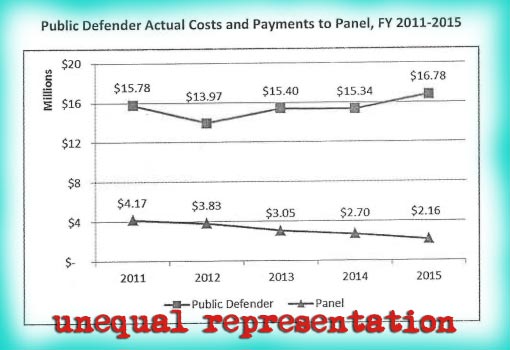GAP IN STRENGTH OF REPRESENTATION BETWEEN POOR JUVENILE DEFENDANTS SERVED BY PANEL ATTORNEYS AND KIDS REPRESENTED BY PUBLIC DEFENDERS, SUGGESTS REPORT
In Los Angeles County, when public defenders are unable to represent juvenile defendants (because of a conflict of interest or other issue), the kids gets bounced to private “panel attorneys,” who are paid a shockingly low flat-fee stipend for each case.
Juvenile advocates have long contended that this panel attorney system means that, on average, some Los Angeles County children get much less service from their attorneys, than others, leading to far different outcomes in their cases—and arguably their lives.
With these concerns in mind, two years ago, the LA County Board of Supervisors passed a motion by Supe. Mark Ridley-Thomas to conduct an analysis of the current juvenile indigent defense system—including how panel attorneys are compensated.
On Monday, County CEO Sachi Hamai returned with that analysis in the form of a 258-page report prepared by the Warren Institute on Law and Social Policy at UC Berkeley School of Law. (Ridley-Thomas’ 2014 motion was in response to a study by Loyola Law School Professor Cyn Yamashiro illuminating serious problems within LA’s system of panel attorneys.)
Between 2010-2014, 67% of new juvenile petitions were assigned to public defenders, while 28% were assigned to panel attorneys.
According to the report, 71% of indigent youth at risk of transfer to adult court were assigned to panel attorneys, while 29% were assigned public defenders. And those kids with panel counsel were more likely to be sent to adult court than their peers represented by public defenders. In the last five years, 25% of young panel attorney clients were transferred to adult court, compared with only 15% of public defender clients.
On average, panel attorneys spent just over half as much time on a case, as public defenders spent on each juvenile case, consulted with fewer experts, filed fewer motions, and provided less documentation in support of their client.
The problem, in large part, is that LA’s panel attorneys’ are paid between $340-$360 for the duration of a case, no matter how long it takes. The set fee means that there is no financial incentive to provide young defendants with quality representation.
The disparities are not due to any lack of care on the part of panel attorneys, however. “It became clear while conducting interviews and outreach for this report that most of the attorneys representing indigent youth in the county do so because they care about their clients,” the report reads. “To allege otherwise does a disservice to many hardworking and committed professionals.”
But juvenile defense extends beyond the scope of adult defense. In addition to representing young clients during criminal proceedings, juvenile defense attorneys are also responsible for “the thorough mental health, substance abuse, educational and developmental evaluations and services and treatment necessary in the modern era of proper Juvenile Delinquency Court administration,” according to State Bar of California guidelines. And the extended representation has become a crucial component of juvenile defense. Research shows that the wraparound representation leads to better outcomes for kids in the form of improved emotional and behavioral health, education, and family health, as well as reduced contact with law enforcement.
The LA County Public Defender’s Office has in-house social workers, investigators, resource attorneys, appellate attorneys, and an immigration attorney. But if a panel attorney needs assistance from an investigator, they must pay out of their own stipend. (For social workers and other experts, the panel attorneys submit a form for the County to cover the cost.)
Panel attorneys used far fewer resources than public defenders, according to the report:
• Investigators: PD 26%; Panel Counsel 9%
• Social Workers: PD 32%; Panel Counsel 1 %
• Doctors and Experts: PD 20%; Panel Counsel 9%
• Education Attorneys: PD 2%; Panel Counsel less than 1 %
After surveying other counties, the report determined that Los Angeles is the only county that doesn’t pay for investigators for their panel lawyers, the only county without oversight for the panel attorney system, and the only county that pays panel attorneys flat-fee rate per petition. For the last decade the California State Bar has said such flat-fee contracts shouldn’t be used.
“The County should ensure that indigent juveniles are provided with competent and effective attorneys whether those attorneys are working within a public defender office or operating by contract; the quality of a defendant’s representation should not be a function of random attorney assignment,” the report reads.
Supes Mark Ridley-Thomas and Sheila Kuehl are expected to read in a co-authored motion for the board meeting today (Tuesday) in response to the report’s findings. The motion will call for a report back in 30 days on ways to remedy flaws in the county’s juvenile indigent defense system.
(We at WLA will be keeping an eye on this issue, and will let you know more as we learn more.)

